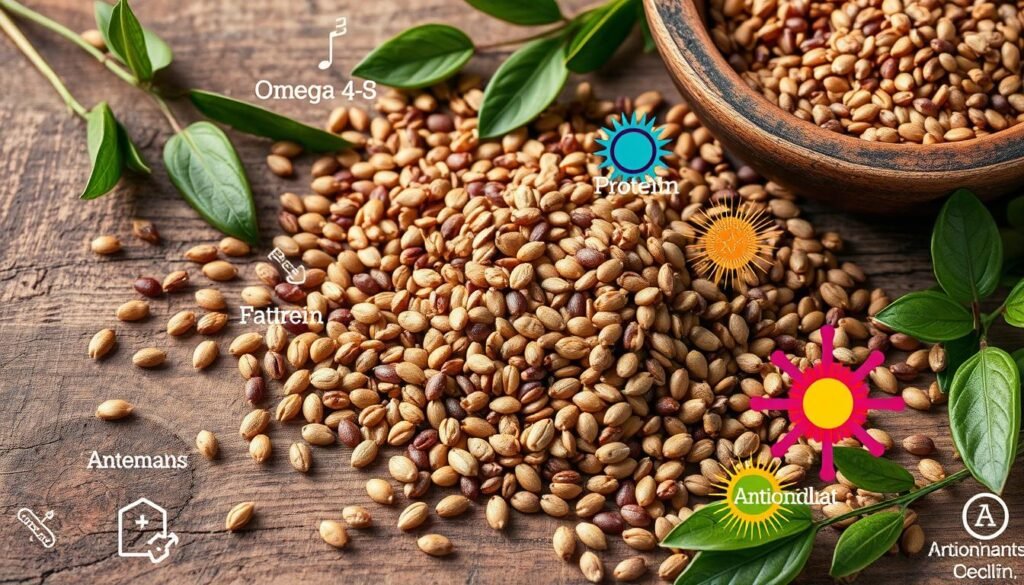10 Benefits of Eating Flaxseed: Your Complete Guide
Are you looking for a nutritional powerhouse? Flaxseed is a versatile superfood that boosts your health. It supports heart health and helps with weight management. Discover the 10 amazing reasons to add flaxseed to your diet.
Key Takeaways
- Flaxseed is a versatile superfood with a wide range of health benefits.
- Rich in omega-3 fatty acids, fiber, and antioxidants, flaxseed supports heart, digestive, and overall health.
- Consuming flaxseed can aid in weight management, blood sugar regulation, and chronic disease prevention.
- Flaxseed offers numerous skin and anti-aging benefits due to its high omega-3 and antioxidant content.
- Incorporating flaxseed into your daily diet is easy and can significantly improve your overall well-being.
Understanding Flaxseed: Nature’s Nutritional Powerhouse
Flaxseed is a small but mighty seed with a long history in traditional medicine. For centuries, it has been valued for its nutritional benefits and uses. Let’s explore its history, products, and nutrients that make it a true powerhouse.
Historical Uses of Flaxseed in Traditional Medicine
Flaxseed has been used for thousands of years. In traditional Chinese medicine, it was used to nourish the body. In Ayurvedic practices, it was seen as a detoxifier. The ancient Egyptians even used it in their bread, knowing its health benefits.
Types of Flaxseed Products Available
- Whole flaxseed: The entire, unprocessed seed, often used in baking or as a crunchy topping.
- Ground flaxseed: Also known as flaxseed meal, this finely ground powder is easy to incorporate into a variety of recipes.
- Flaxseed oil: Extracted from the seeds, flaxseed oil is a rich source of flaxseed omega-3 fatty acids.
- Flaxseed supplements: Available in capsule or tablet form, these provide a concentrated dose of flaxseed’s beneficial compounds.
Basic Nutritional Profile
Flaxseed nutrition facts show it’s packed with nutrients. It’s a great source of omega-3 fatty acids, fiber, and lignans. Just one tablespoon of ground flaxseed has about 2 grams of omega-3 fatty acids, 2 grams of fiber, and many vitamins and minerals.
“Flaxseed is a nutritional powerhouse, packed with essential nutrients that can have a profound impact on overall health and well-being.”
Omega-3 Fatty Acids: The Heart-Healthy Champions in Flaxseed
Flaxseed is a real powerhouse for heart health, thanks to its omega-3 fatty acids. The main omega-3 in flaxseed is alpha-linolenic acid (ALA). It has been studied a lot for its heart benefits.
Flaxseed helps heart health by reducing inflammation. ALA, a strong anti-inflammatory, lowers harmful body inflammation. This is a big risk for heart disease. Flaxseed keeps blood vessels healthy and the heart strong.
But there’s more. Flaxseed’s omega-3s also lower cholesterol levels, especially the bad LDL cholesterol. This helps prevent heart attacks, strokes, and other heart problems.
| Nutrient | Amount in Flaxseed | Daily Recommended Intake |
|---|---|---|
| Omega-3 fatty acids (ALA) | 6.8 grams per 1 tbsp | 1.1-1.6 grams per day |
Adding flaxseed to your diet is a great way to get these heart-healthy omega-3s. You can sprinkle it on cereal, blend it into smoothies, or bake it into recipes. Flaxseed omega-3 fatty acids are a great addition to your wellness routine.
“Flaxseed is a true superfood when it comes to supporting cardiovascular health. Its high omega-3 content makes it a must-have in any heart-healthy diet.”
How Flaxseed Supports Weight Management and Metabolism
Adding flaxseed to your diet can help with weight management and improve your metabolism. Its high fiber and omega-3 fatty acids are key. These nutrients support weight loss efforts.
Appetite Control Properties
Flaxseed is known for making you feel full and satisfied. Its fiber slows digestion, keeping you full longer. This can help you eat fewer calories and reach your weight loss goals.
Metabolic Benefits for Weight Loss
Flaxseed does more than just curb hunger. It also boosts your metabolism. The omega-3s in flaxseed help burn fat and increase energy. The fiber also helps control blood sugar, reducing insulin resistance and improving metabolism.
Recommended Daily Intake for Weight Management
- Experts suggest eating 1-2 tablespoons of ground flaxseed daily for weight management.
- Adding flaxseed to smoothies, yogurt, or baked goods is a simple way to enjoy its benefits.
- Start with small amounts and gradually increase to adjust to the fiber.
Flaxseed’s fiber and omega-3s can help with weight management and boost metabolism. Adding it to your daily routine can enhance your wellness journey.
Flaxseed’s Role in Digestive Health and Fiber Content
Flaxseed is a nutritional powerhouse. Its high fiber content is key to good digestive health. It has both soluble and insoluble fibers, each with its own benefits.
The soluble fiber, called mucilage, softens and bulks up your stool. This helps with regular and healthy bowel movements. It also feeds the good bacteria in your gut, keeping your digestive system balanced.
The insoluble fiber helps food move through your digestive tract better. This reduces constipation and other issues. It also adds bulk to your stool, making bowel movements more comfortable.
Just two tablespoons of ground flaxseed have 10 grams of fiber. This is a big part of the daily fiber you need. Flaxseed is great for your digestive health and can help with specific gut issues.
| Type of Fiber | Benefit |
|---|---|
| Soluble Fiber (Mucilage) | Softens and adds bulk to stool, supports gut microbiome |
| Insoluble Fiber | Promotes efficient digestion and regular bowel movements |
Adding flaxseed to your diet can boost your digestive health. You can sprinkle it on cereal, blend it into smoothies, or use it in baking. Flaxseed is a versatile and nutritious choice for a healthy lifestyle.
Blood Sugar Regulation and Diabetes Management Benefits
Flaxseed is getting more attention for helping with blood sugar control and diabetes management. It’s packed with flaxseed nutrition facts like fiber, omega-3s, and lignans. These nutrients are key for flaxseed blood sugar regulation.
Impact on Insulin Sensitivity
Research shows that flaxseed’s high fiber can boost insulin sensitivity. This is crucial for managing blood sugar. The omega-3s in flaxseed also help insulin work better, making it easier for the body to handle glucose.
Glycemic Control Properties
Flaxseed has a low glycemic index. This means it doesn’t cause blood sugar to spike quickly after eating. It’s great for people with diabetes or anyone wanting to keep blood sugar in check.
“Incorporating flaxseed into your daily routine can be a simple and effective way to support blood sugar management and overall metabolic health.”
Many studies highlight flaxseed’s role in blood sugar regulation and insulin sensitivity. Its fiber, omega-3s, and lignans make it a great choice for those with diabetes or looking to keep blood sugar levels healthy.
Flaxseed 10 Benefits of Eating: A Comprehensive Overview
Flaxseed is a small but powerful seed, packed with health benefits. It’s great for heart health and weight management. Let’s look at the top 10 reasons to add flaxseed to your diet.
- Omega-3 Fatty Acids: Flaxseed is rich in alpha-linolenic acid (ALA). This omega-3 fatty acid is key for a healthy heart and lowers heart disease risk.
- Fiber Content: Flaxseed is high in fiber. It helps with digestion, bowel movements, and gut health. It also makes you feel full, helping with weight control.
- Blood Sugar Regulation: Flaxseed’s fiber and lignans improve insulin sensitivity. This helps regulate blood sugar, good for those with diabetes or anyone wanting healthy blood sugar levels.
- Anti-inflammatory Properties: Flaxseed has omega-3s and lignans that fight inflammation. This can lower the risk of chronic diseases.
- Cancer-Fighting Potential: Lignans in flaxseed may reduce cancer risk, including breast and prostate cancer. They act as antioxidants and balance hormones.
- Skin Health and Anti-aging: Omega-3s in flaxseed keep skin elastic and boost collagen. This leads to a youthful, glowing skin.
- Appetite Control: Flaxseed’s fiber and protein make you feel full. This can help manage weight by reducing appetite and calorie intake.
- Metabolic Benefits: Flaxseed boosts metabolism. It aids in weight loss by burning fat and improving insulin sensitivity.
- Bone Health: Flaxseed’s lignans increase bone mineral density. This is good for strong, healthy bones.
- Cognitive Function: Omega-3s in flaxseed improve brain function and cognitive performance. They may reduce age-related cognitive decline.
Flaxseed is a nutritional powerhouse, offering many health benefits. Adding it to your diet can boost your well-being. Enjoy the flaxseed 10 benefits of eating it.

“Flaxseed is one of nature’s most remarkable superfoods, offering a wealth of essential nutrients and health-promoting properties.”
Anti-inflammatory Properties and Chronic Disease Prevention
Flaxseed is known for its strong anti-inflammatory effects. This is thanks to its omega-3 fatty acids and lignans. These compounds fight inflammation at the cellular level, helping to prevent chronic diseases.
Fighting Inflammation Naturally
The omega-3 fatty acids in flaxseed, like alpha-linolenic acid (ALA), have strong anti-inflammatory effects. They help control the body’s inflammatory response. This reduces harmful molecules and promotes health.
Flaxseed’s lignans also play a role. They help manage enzymes involved in inflammation. This targeted action offers long-term health benefits.
Long-term Health Benefits
- Reduced risk of cardiovascular disease: Flaxseed’s anti-inflammatory properties protect the heart and blood vessels. This lowers the risk of heart attacks and atherosclerosis.
- Improved joint health: Flaxseed’s anti-inflammatory effects can ease arthritis symptoms. It reduces joint pain and stiffness.
- Reduced risk of certain cancers: Research shows flaxseed may prevent some cancers, like prostate and breast cancer. This is due to its anti-inflammatory and antioxidant properties.
Adding flaxseed to your diet can help. It uses its flaxseed anti-inflammatory properties and flaxseed omega-3 fatty acids to support health. It also lowers the risk of chronic diseases.
Cancer-Fighting Properties and Antioxidant Benefits
Flaxseed is a nutritional powerhouse with amazing cancer-fighting properties. It’s packed with antioxidants, including lignans. These have been studied for their ability to lower cancer risk.
Flaxseed’s high lignan content is key in fighting cancer. Lignans are plant compounds that can stop cancer cells from growing and spreading. Studies show eating flaxseed can lower the risk of breast, prostate, and colon cancers.
Flaxseed also has other antioxidants like alpha-linolenic acid (ALA), an omega-3 fatty acid. These antioxidants fight off harmful free radicals, protecting DNA from damage and cancer. They may also help reduce inflammation, which is important in cancer.
- Flaxseed is a rich source of lignans, which have been shown to inhibit the growth and spread of cancer cells.
- Numerous studies have linked the consumption of flaxseed to a reduced risk of breast, prostate, and colon cancers.
- Flaxseed’s antioxidant properties, including its high content of omega-3 fatty acids, may help to prevent DNA damage and reduce inflammation, two key factors in cancer development.
“Flaxseed is a remarkable natural resource, rich in compounds that possess the potential to combat cancer and promote overall health. Its antioxidant properties and cancer-fighting abilities make it a must-have in any health-conscious individual’s diet.”
Skin Health and Anti-aging Benefits of Flaxseed
Flaxseed is packed with nutrients and offers great benefits for your skin. It’s rich in omega-3 fatty acids and antioxidants. These are key for healthy, glowing skin.
Omega-3s for Skin Elasticity
Flaxseed’s omega-3s are vital for keeping your skin elastic and soft. They feed and hydrate your skin, reducing wrinkles. Eating flaxseed regularly can make your skin look younger and more vibrant.
Collagen Production Support
Flaxseed boosts collagen production, which keeps your skin firm. More collagen means less sagging and tighter skin. This helps you look younger and more radiant.
Adding flaxseed to your meals is a simple way to improve your skin’s health. Sprinkle it on cereal, blend it in smoothies, or use it in recipes. The flaxseed skin health benefits and flaxseed omega-3 fatty acids will give you a glowing complexion.

How to Incorporate Flaxseed Into Your Daily Diet
Adding flaxseed to your meals is easy and tasty. It boosts omega-3s and aids digestion. Flaxseed fits well in many dishes.
Start by sprinkling ground flaxseed on oatmeal, yogurt, or smoothies. It adds a nutty flavor and crunchy texture. You can also add whole flaxseeds to baked goods like muffins and cookies.
- Add a tablespoon of ground flaxseed to your favorite pancake or waffle batter.
- Sprinkle whole flaxseeds on top of salads, soups, and roasted vegetables.
- Stir a teaspoon of flaxseed oil into your dressings and marinades for a heart-healthy twist.
For a quick flaxseed boost, blend it into your smoothie. Flaxseed is easy to add to your diet. This way, you get all its health benefits.
| Flaxseed Product | Suggested Serving Size | Nutritional Benefits |
|---|---|---|
| Ground Flaxseed | 1-2 tablespoons | High in fiber, omega-3s, and lignans |
| Whole Flaxseed | 1-2 tablespoons | Rich in fiber and omega-3s, may aid digestion |
| Flaxseed Oil | 1-2 teaspoons | Excellent source of omega-3 fatty acids |
Flaxseed in your diet brings many natural health benefits. Try different ways to enjoy it. You’ll love the taste and health perks.
Potential Side Effects and Precautions
Flaxseed is packed with nutrients, offering flaxseed 10 benefits of eating. Yet, it’s key to know about possible side effects and precautions. This ensures a safe addition to your meals.
Flaxseed’s high fiber can cause issues like bloating, gas, and diarrhea if eaten in excess. Start with small amounts and slowly increase. This helps your body adjust without discomfort.
- Potential side effects of flaxseed include digestive discomfort, such as bloating, gas, and diarrhea.
- Flaxseed may interact with certain medications, including blood thinners and diabetes medications, so it’s crucial to consult with your healthcare provider before adding it to your diet.
- Pregnant and breastfeeding women, as well as individuals with certain medical conditions, should exercise caution when consuming flaxseed and seek guidance from their healthcare provider.
Flaxseed can also affect some medications, like blood thinners and diabetes drugs. Always talk to your doctor before adding it to your diet, especially if you’re on any medications.
| Flaxseed Precautions | Recommended Dosage |
|---|---|
| Digestive issues (bloating, gas, diarrhea) | Start with small servings and gradually increase |
| Interactions with blood thinners and diabetes medications | Consult with your healthcare provider |
| Pregnancy and breastfeeding | Seek guidance from your healthcare provider |
By understanding these precautions and following the guidelines, you can enjoy flaxseed safely. This way, you can reap its health benefits while keeping your body in top shape.
Conclusion
The flaxseed 10 benefits of eating make it a great addition to any diet. It’s good for your heart and has anti-inflammatory effects. This seed is packed with benefits for your overall health.
Adding flaxseed 10 benefits of eating to your day can help your heart and weight. It also improves digestion and fights chronic diseases. Its many uses show how it can greatly improve your health over time.
You can add ground flaxseed to smoothies, salads, or baked goods. Making flaxseed nutrition facts a part of your diet is easy and can change your life. Enjoy the many benefits of flaxseed 10 benefits of eating for a healthier, happier you.
Gold Whole Milled Flaxseed 🌿
https://amzn.to/3BGzCaq Amazon
FAQ
What are the key benefits of eating flaxseed?
Flaxseed is packed with nutrients that boost your health. It supports heart health, aids in weight management, and improves digestion. It also helps control blood sugar, fights inflammation, and may prevent cancer. Its omega-3s, fiber, and antioxidants are good for your overall well-being.
How does the omega-3 content in flaxseed benefit heart health?
The omega-3s in flaxseed, especially alpha-linolenic acid (ALA), are great for your heart. They lower cholesterol, reduce inflammation, and improve heart function. This can lower your risk of heart disease.
How can flaxseed aid in weight management and metabolism?
Flaxseed’s fiber and appetite-suppressing effects can help you feel full. This can aid in weight loss and management. Its metabolic benefits, like improving insulin sensitivity, also support a healthy metabolism and weight.
What digestive health benefits does flaxseed provide?
Flaxseed’s fiber is key for digestive health. It helps regulate bowel movements and supports a healthy gut. This contributes to overall digestive wellness.
How can flaxseed help with blood sugar regulation and diabetes management?
Flaxseed improves insulin sensitivity and glycemic control. Its fiber and lignans help stabilize blood sugar. This is good for people with diabetes or at risk of it.
What are the anti-inflammatory and chronic disease prevention benefits of flaxseed?
The omega-3s and lignans in flaxseed have strong anti-inflammatory effects. They fight chronic inflammation, which is linked to many diseases. Eating flaxseed may lower your risk of heart disease, cancer, and autoimmune disorders.
How can flaxseed contribute to skin health and anti-aging benefits?
Flaxseed’s omega-3s and antioxidants support skin health and elasticity. They also boost collagen production. This can help keep your skin looking young and glowing, slowing down aging signs.
Are there any potential side effects or precautions to consider when consuming flaxseed?
Flaxseed is usually safe, but there are precautions. Start with small amounts to avoid digestive issues from its high fiber. People with certain health conditions should talk to their doctor before eating flaxseed.
